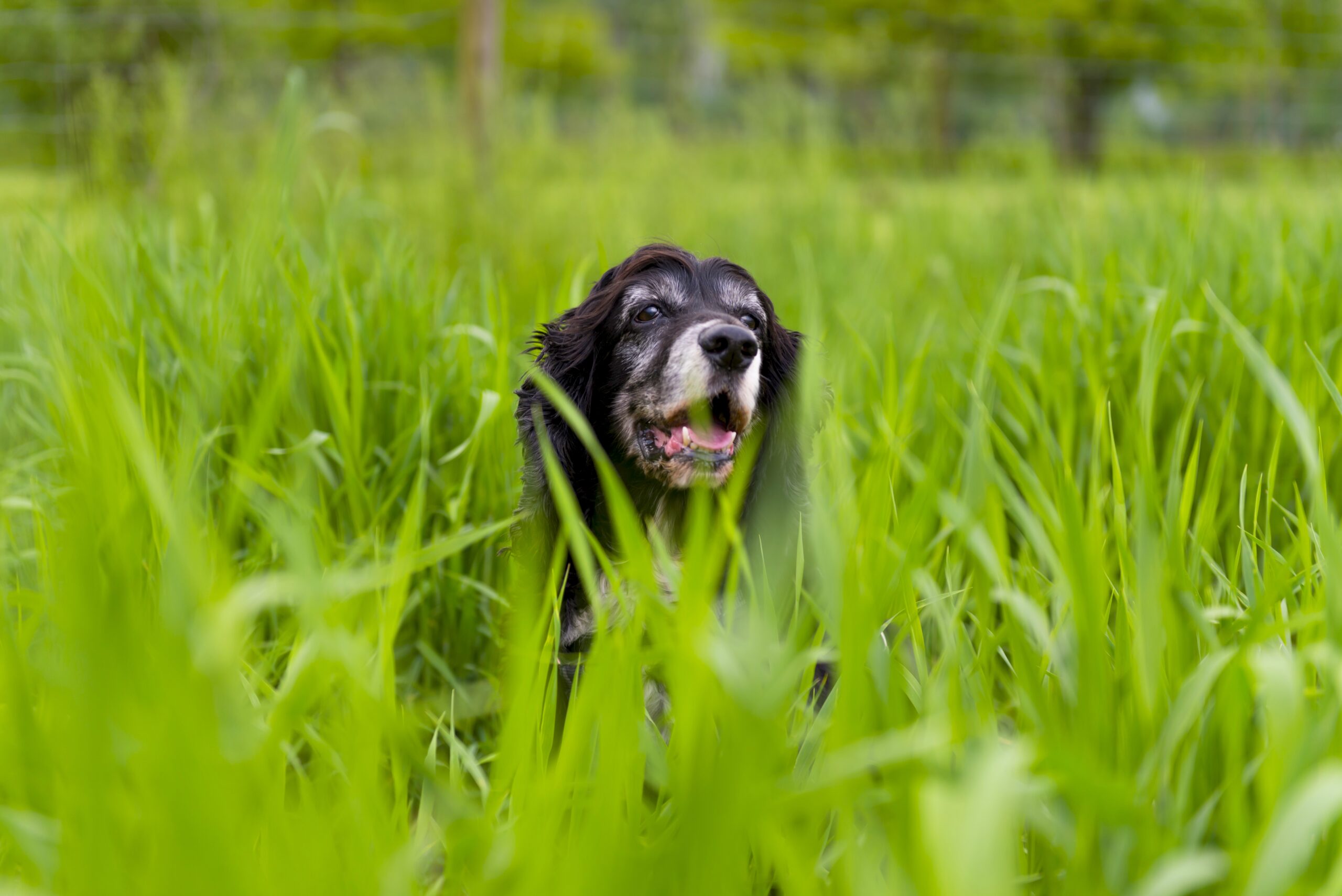Grass eating is a very common behaviour in dogs. In fact, 79% of dog owners report that their dog eats grass or other plants, with 68% of these reported to eat it on a weekly, or even daily basis (1). You’ve probably heard dogs eat grass because they feel poorly or are lacking certain nutrients in their diet, however this is a common misconception and is often not the case.
What Are The Common Reasons For Grass Eating?
Boredom
A bored dog may graze on grass for lack of anything more exciting to do. To try and curb this, make sure your dog is well exercised, and entertained. Offer some breed-appropriate enrichment and reward engagement. Some dogs will even adopt grass eating as an attention-seeking behaviour, so it’s important not to reinforce this, but to redirect them.
Hunger
Research has shown that grass eating is linked to the time of day, with hungry dogs more likely to indulge (2). Grass eating was more common in the mornings, gradually decreasing throughout the day.
Habit
Some dogs develop a ‘taste’ for grass, which can hook them onto the habit of eating it. The more vibrant and fresh the grass, the more appealing it seems to dogs. This is especially the case in the spring and summer, where new, tasty grass shoots come through.
Instinct
Grass eating is, surprising as it may seem, a natural behaviour not only in our dogs, but in wild canids too (1). Whilst some of the plant material ingested by canids comes from the gut contents of their prey, there is evidence of them selecting grasses to consume. It has been suggested that the natural purpose of this is for the scouring effects grass has against debris and parasites in the gut.
Nutrition
Some dogs eat grass to get more fibre in their diet. Dogs have a limited ability to digest grass, making it a useful source of insoluble fibre which can support digestion. Grass can also act as a prebiotic, supporting your dog’s natural gut microflora.
Tummy Troubles
It’s been suggested that occasionally, dogs will eat grass as a laxative or emetic (3). However, grass eating is not inevitably a sign of illness. Only 9% of dogs show signs of illness prior to grass eating, with just 22% reported to vomit afterwards (1). Sometimes dogs will vomit has a result of eating grass, rather than eating grass to induce vomiting. One study actually found that dogs experiencing mild gastrointestinal distress ate less grass than healthy dogs (3).
Is My Dog Missing Nutrients?
One study (1) tested the hypothesis that grass eating reflected some kind of dietary deficiency in dogs, yet no relationship was found between diet format and frequency of grass eating. There is no current evidence that dogs who eat grass are lacking in nutrients.
Should I Stop My Dog Eating Grass?
This really depends on the reason why they’re eating it. If you suspect it’s due to boredom or stress, then you should redirect your dog, and provide enrichment to prevent this becoming a compulsive habit. If you suspect your dog needs more fibre in their diet, it may be worth adding a fibre supplement to see if this helps curb the grass eating behaviour.
Our Shepherd’s Mix is a natural herb and flaxseed blend, packed with fibre, protein, and micronutrients to enhance your dog’s diet. This mix can naturally support your dog’s digestion and keep it working to peak efficiency, thanks to its abundance of natural prebiotics which feed a dog’s healthy gut microbiome.
Just be cautious allowing your dog to eat grass in unknown areas. The biggest risk to a dog eating grass is chemicals and pesticides, which can make them poorly.
Should I Take my Pet to The Vet For Grass Eating?
As discussed, there are several reasons why a dog may eat grass, and it’s often nothing to worry about. However, if there is a change in your dog’s general condition or appetite (such as eating grass and rejecting food), we recommend consulting a vet to rule out any underlying issues.

References
- Seuda, K. L. C. et al. (2008) ‘Characterisation of plant eating in dogs,’ Applied Animal Behaviour Science, 111(1-2), 120-132. Available at: https://www.sciencedirect.com/science/article/abs/pii/S0168159107001827
- Bjone, S. J. et al. (2007) ‘Grass eating patterns in the domestic dog, Canis familiaris,’ University of New England. Available at: https://www.une.edu.au/staff-profiles/ers/wbrown/files/bjone-brown-price-grass-eating20patterns-raan-2007.pdf
- McKenzie, S. J. et al. (2010) ‘Reduction in grass eating behaviours in the domestic dog, Canis familiaris, in response to a mild gastrointestinal disturbance,’ Applied Animal Behaviour Science, 123(1-2) 51-55.
Lucy James, BSc (Hons) Bioveterinary Science
Looking to enhance your pet’s diet? Take a look at Cotswold RAW’s range of raw dog food and raw cat food, including raw meaty bones, dried treats, and puppy food.

